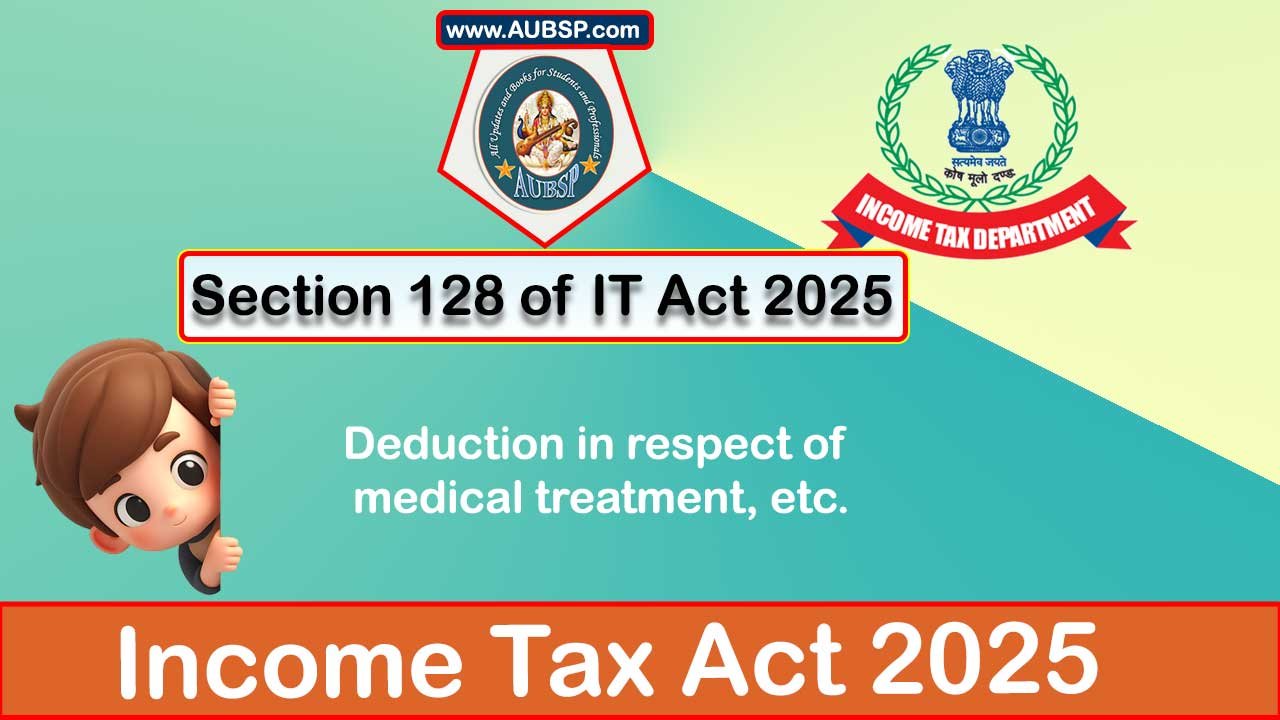Deduction in respect of medical treatment, etc.
[Section-128 as per the Income Tax Act, 2025 (this Act) w.e.f. 1st April, 2026.]
Section 128(1) of Income Tax Act 2025
128(1) An assessee who is resident in India, shall be allowed a deduction of the amount actually paid during the tax year or a sum of forty thousand rupees, whichever is less, from income chargeable to tax of that tax year, for the medical treatment of such disease or ailment as prescribed—
- (a) for himself or a dependant, in case the assessee is an individual; or
- (b) for any member of a Hindu undivided family, in case the assessee is a Hindu undivided family.
Section 128(2) of Income Tax Act 2025
128(2) A deduction shall be allowed under this section only if the assessee obtains the prescription for the medical treatment from a neurologist, oncologist, urologist, haematologist, immunologist, or any other specialist, as prescribed.
Section 128(3) of Income Tax Act 2025
128(3) The deduction under this section shall be reduced by any amount received under an insurance from an insurer, or reimbursed by an employer, for the medical treatment of the person as referred to in sub-section (1)(a) or (b).
Section 128(4) of Income Tax Act 2025
128(4) If the amount actually paid is in respect of the assessee or his dependant or any member of a Hindu undivided family of the assessee and who is senior citizen, the amount of deduction as referred to in sub-section (1) shall be substituted with one lakh rupees for forty thousand rupees.
Section 128(5) of Income Tax Act 2025
128(5) In this section,––
- (a) “dependant” shall have the meaning as provided in section 127;
- (b) “insurer” shall have the meaning assigned to it in section 2(9) of the Insurance Act, 1938.
FAQs on Section 128(5) of Income Tax Act 2025
Who is eligible to claim deduction under Section 128 of the Income Tax Act, 2025?
An assessee who is a resident in India is eligible to claim the deduction.
What is the maximum deduction allowed under Section 128(1)?
The deduction is limited to the amount actually paid during the tax year or forty thousand rupees, whichever is less.
For whose medical treatment can the deduction be claimed by an individual?
An individual can claim the deduction for himself or a dependant.
Who can be covered under the deduction if the assessee is a Hindu Undivided Family (HUF)?
The deduction can be claimed for any member of the HUF.
Is there any requirement to obtain a prescription for claiming the deduction?
Yes, the prescription must be obtained from a neurologist, oncologist, urologist, haematologist, immunologist, or any other prescribed specialist.
Can the deduction be claimed if the medical expenses are reimbursed by insurance or employer?
No, the deduction is reduced by the amount received under insurance or reimbursed by the employer.
What happens if the person receiving treatment is a senior citizen?
If the patient is a senior citizen, the maximum deduction is increased to one lakh rupees instead of forty thousand rupees.
What is the meaning of “dependant” for the purpose of this section?
The term “dependant” has the meaning provided in Section 127 of this Act.
What is the meaning of “insurer” in the context of Section 128?
“Insurer” refers to the definition given in Section 2(9) of the Insurance Act, 1938.
Is the deduction available for any disease or ailment?
No, the deduction is available only for such disease or ailment as may be prescribed.
Can a non-resident claim this deduction?
No, this deduction is available only to residents in India.
Is the deduction allowed on estimated expenses or only on actual payment?
The deduction is allowed only on the amount actually paid during the tax year.
Is there a separate limit for each family member if the assessee has multiple dependants?
No, the overall limit of deduction applies per assessee, not per family member.
Can the deduction be claimed without obtaining a specialist’s prescription?
No, obtaining the specialist’s prescription is mandatory to claim the deduction.
Is it necessary that the medical treatment must be taken in India?
The section does not specify location, but deduction is tied to the resident assessee and prescribed diseases and specialists, which typically implies treatment in India.
What if the assessee pays the amount in installments during the year?
The total actual amount paid during the tax year (subject to the limit) is considered for deduction, irrespective of installment payments.
Can both an individual and an HUF claim deductions for the same member if the member is part of both?
No, the deduction is allowable to only one assessee for a particular medical treatment expense.
If the treatment is for a senior citizen dependant, does the Rs. 1 lakh limit apply to both individuals and HUFs?
Yes, if the patient is a senior citizen (whether a dependant of an individual or member of HUF), the enhanced limit of Rs. 1 lakh applies.
Does this deduction apply only for in-patient hospitalization?
No such restriction is mentioned; it applies to medical treatment of specified diseases, regardless of inpatient status, provided other conditions are met.
What documents should be maintained to support the deduction claim?
Prescription from the specified specialist and proof of actual payment (like bills, receipts) should be retained.

